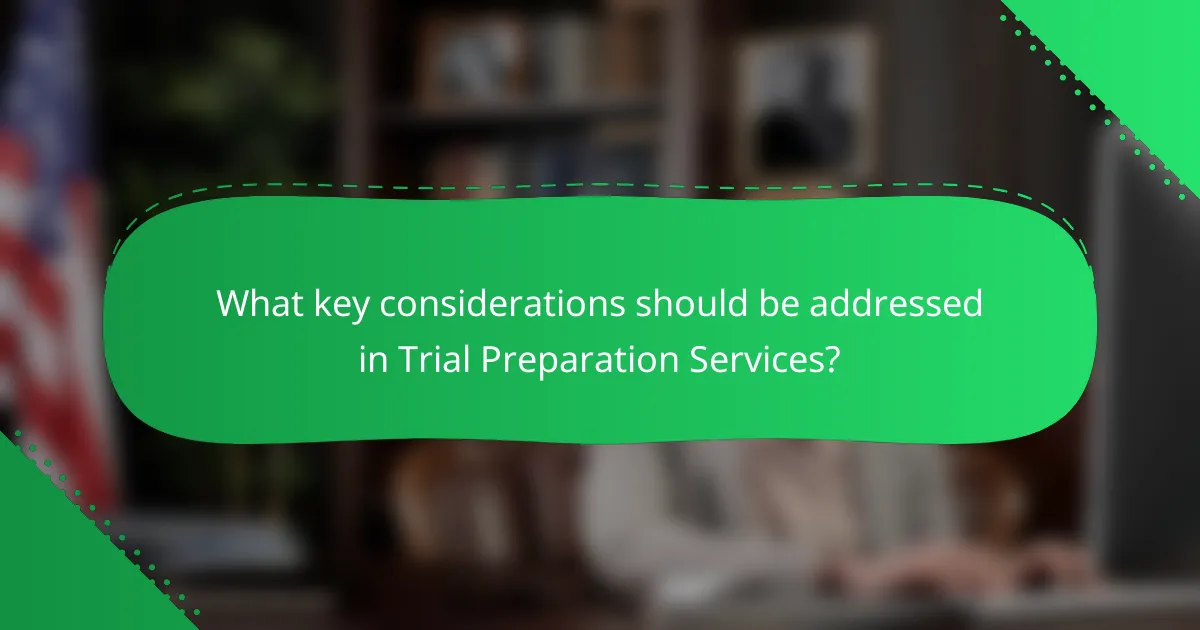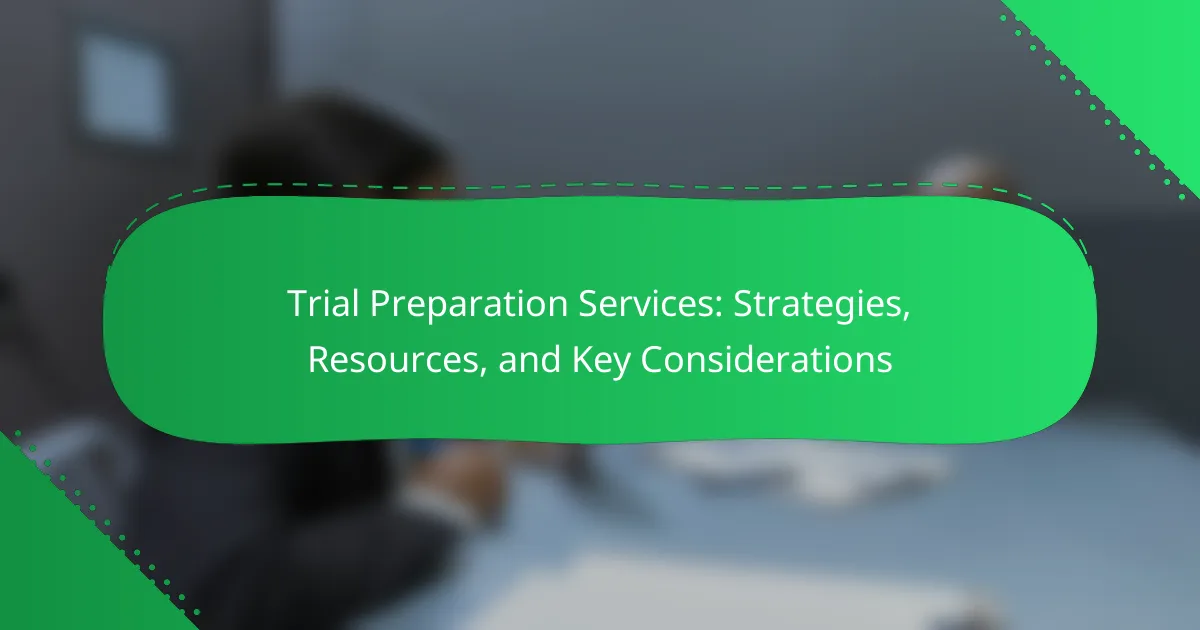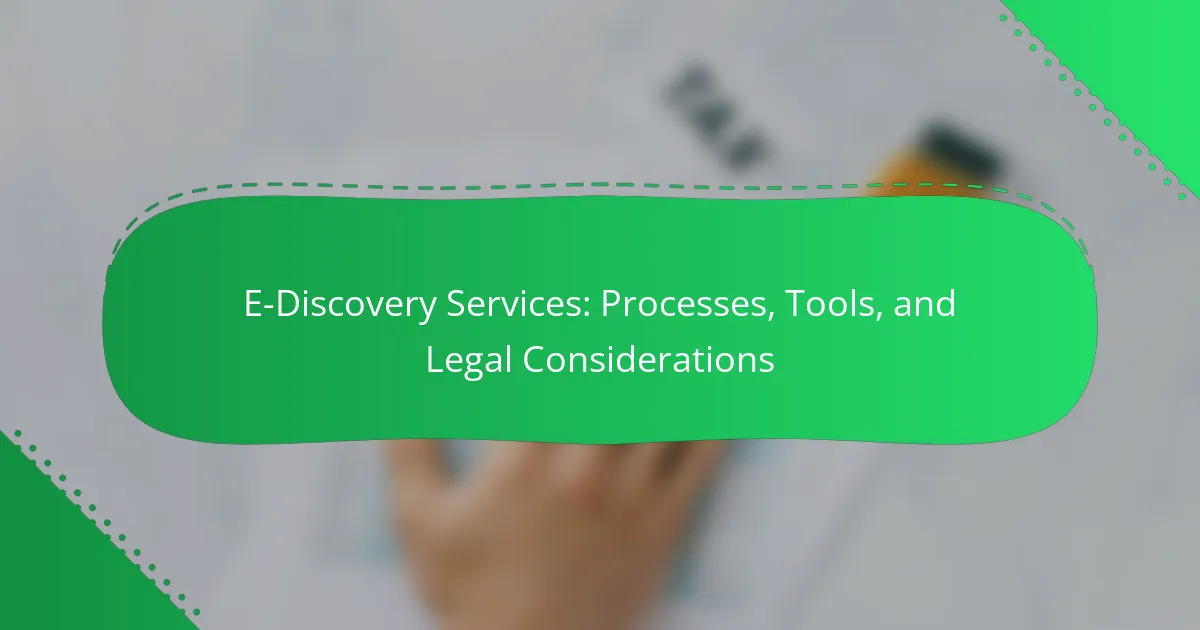Trial preparation services are essential professional support services that assist legal teams in effectively preparing for court trials. These services encompass organizing case materials, developing trial strategies, and coordinating witness preparation to ensure relevant evidence is presented clearly. Key considerations include thorough case analysis to identify strengths and weaknesses, effective witness preparation for credible testimonies, and streamlined evidence organization for efficient retrieval. Additionally, various resources such as legal research databases, trial presentation software, and expert witness directories are available to enhance the preparation process. Understanding court procedures and fostering collaboration among team members are also critical for achieving successful trial outcomes.

What are Trial Preparation Services?
Trial preparation services are professional support services designed to assist legal teams in preparing for court trials. These services typically include organizing case materials, developing trial strategies, and coordinating witness preparation. They help ensure that all relevant evidence is effectively presented. Trial preparation services can also involve mock trials or jury simulations to test arguments. A well-prepared trial team can improve the chances of a favorable outcome. These services are crucial for managing complex cases efficiently.
How do Trial Preparation Services function?
Trial preparation services function by organizing and managing the necessary components for a legal trial. These services include gathering evidence, preparing witness lists, and developing trial strategies. They assist attorneys in creating compelling arguments and presentations. Trial preparation services also involve drafting legal documents and motions. They ensure compliance with court procedures and deadlines. These services may provide mock trials to simulate courtroom conditions. They help identify key issues and potential challenges in a case. Ultimately, trial preparation services aim to enhance the effectiveness of legal representation in court.
What key processes are involved in Trial Preparation Services?
Key processes involved in Trial Preparation Services include case assessment, evidence gathering, witness preparation, and trial strategy development. Case assessment involves analyzing the facts and legal issues of the case. Evidence gathering includes collecting documents, testimonies, and physical evidence relevant to the case. Witness preparation focuses on coaching witnesses to ensure they present their testimony effectively. Trial strategy development entails formulating a plan on how to present the case in court. These processes are essential for building a strong case and increasing the chances of a favorable outcome.
How do these processes contribute to successful trial outcomes?
The processes of trial preparation services contribute to successful trial outcomes by ensuring thorough planning and resource allocation. Effective trial preparation includes rigorous protocol development, which defines clear objectives and methodologies. This clarity helps reduce errors and enhances participant recruitment strategies. Comprehensive training for trial staff ensures adherence to protocols, which increases data integrity. Additionally, timely budgeting and resource management prevent delays, fostering a smooth trial execution. Historical data shows that well-prepared trials have higher success rates, with studies indicating that 70% of successful trials follow structured preparation processes.
What are the main components of Trial Preparation Services?
The main components of Trial Preparation Services include case analysis, evidence collection, and witness preparation. Case analysis involves reviewing case details to identify key issues and strategies. Evidence collection focuses on gathering relevant documents and materials to support the case. Witness preparation ensures that witnesses understand their roles and can provide credible testimony. These components are essential for effective trial preparation and contribute to a well-organized presentation in court.
What types of resources are essential for effective trial preparation?
Essential resources for effective trial preparation include legal research tools, case management software, and expert witnesses. Legal research tools provide access to relevant statutes and case law. Case management software helps organize case documents and schedules. Expert witnesses offer specialized knowledge to strengthen arguments. Additionally, trial exhibits and demonstrative evidence are crucial for presenting information clearly. These resources enhance the efficiency and effectiveness of trial preparation.
How do legal teams utilize these resources in preparation?
Legal teams utilize trial preparation resources to streamline case management and enhance their strategies. They analyze legal documents and evidence to build strong arguments. Research tools help them gather relevant case law and precedents. Collaboration platforms enable efficient communication among team members. They also leverage technology for document review and organization. Resources like expert witnesses provide specialized knowledge to strengthen their position. Training sessions on trial techniques prepare attorneys for courtroom presentations. Overall, these resources improve the effectiveness and efficiency of legal preparations.
What strategies enhance Trial Preparation Services?
Effective strategies for enhancing Trial Preparation Services include thorough case analysis, organized documentation, and mock trials. Thorough case analysis identifies strengths and weaknesses in the case. Organized documentation ensures all relevant materials are easily accessible. Mock trials simulate the courtroom experience, allowing for practice and feedback. These strategies improve confidence and readiness for actual trials. Research indicates that structured preparation leads to better outcomes in legal proceedings. A study by the National Center for State Courts found that organized trial preparation can reduce trial time by up to 30%.
How can technology improve trial preparation efficiency?
Technology can improve trial preparation efficiency by streamlining processes and enhancing collaboration. Digital document management systems allow easy access to case files and evidence. This reduces time spent searching for physical documents. Automated scheduling tools help coordinate meetings and deadlines effectively. Virtual communication platforms facilitate real-time discussions among team members. Data analytics can identify trends and insights from past cases. This informs strategy development for future trials. Additionally, electronic discovery tools expedite the review of large volumes of information. These advancements collectively lead to faster and more organized trial preparations.
What best practices should be adopted for effective trial preparation?
Effective trial preparation requires thorough organization and planning. First, gather all relevant documents and evidence. This includes witness statements, expert reports, and discovery materials. Next, develop a clear trial strategy. Outline key arguments and anticipate opposing viewpoints. Practice presenting the case through mock trials. This helps identify weaknesses and refine delivery. Additionally, ensure all legal deadlines are met. Missing deadlines can jeopardize the case. Communication with the client is vital. Keep them informed about the process and expectations. Finally, review and rehearse with the legal team regularly. This promotes cohesion and confidence in the courtroom.

What key considerations should be addressed in Trial Preparation Services?
Key considerations in Trial Preparation Services include thorough case analysis, witness preparation, and evidence organization. Case analysis identifies strengths and weaknesses. This helps in formulating effective strategies. Witness preparation ensures that testimonies are clear and credible. Effective communication with witnesses builds confidence. Evidence organization streamlines the presentation process. Proper categorization aids in quick retrieval during trial. Additionally, understanding court procedures is crucial. Familiarity with local rules can impact case outcomes. Lastly, collaboration among legal team members enhances overall efficiency. Each consideration plays a vital role in successful trial preparation.
How do timelines impact Trial Preparation Services?
Timelines significantly impact Trial Preparation Services by dictating the schedule for case development and resource allocation. A well-defined timeline ensures that all necessary documents and evidence are prepared in advance. This preparation enhances the efficiency of the trial process. Timelines also help in coordinating between various stakeholders, such as legal teams and expert witnesses. Timely communication can prevent last-minute issues that may arise. According to the American Bar Association, adherence to timelines is crucial for maintaining the integrity of the legal process. Effective timeline management leads to better case outcomes and client satisfaction.
What factors influence the duration of trial preparation?
The duration of trial preparation is influenced by several key factors. The complexity of the case significantly impacts preparation time. Cases with multiple parties or intricate legal issues require more extensive research and documentation. The availability of evidence also plays a crucial role. Limited access to crucial documents can delay the process.
Additionally, the experience level of the legal team affects preparation duration. More experienced attorneys may navigate the process more efficiently. The timeline set by the court can impose strict deadlines, influencing how quickly preparation must occur.
Communication between involved parties is another factor. Effective communication can streamline information sharing and reduce delays. Finally, the resources available, including technology and support staff, can enhance efficiency in trial preparation. Each of these factors contributes to the overall timeline of trial readiness.
How can teams manage time effectively during preparation?
Teams can manage time effectively during preparation by implementing structured planning and prioritization. Establishing clear objectives helps to focus efforts on essential tasks. Utilizing project management tools can streamline workflow and enhance communication. Setting deadlines for each task encourages accountability and timely completion. Regular check-ins allow teams to assess progress and make necessary adjustments. Delegating responsibilities ensures that tasks are evenly distributed among team members. Time-blocking techniques can help in allocating specific hours for focused work. Finally, reflecting on completed tasks can improve future time management strategies.
What are the common challenges faced in Trial Preparation Services?
Common challenges faced in Trial Preparation Services include limited resources, tight deadlines, and complex legal requirements. Limited resources can hinder access to necessary materials and personnel. Tight deadlines may lead to rushed preparations, increasing the risk of mistakes. Complex legal requirements often necessitate extensive research and documentation. Additionally, communication gaps among team members can result in misunderstandings. Maintaining organization during the preparation process is crucial yet challenging. These factors can significantly impact the overall effectiveness of trial preparation services.
How can teams overcome resource constraints during preparation?
Teams can overcome resource constraints during preparation by prioritizing tasks and optimizing resource allocation. They should conduct a thorough assessment of available resources. Identifying critical tasks allows teams to focus on high-impact activities. Collaboration and communication among team members can enhance efficiency. Utilizing technology and tools can streamline processes and reduce time spent on manual tasks. Additionally, seeking external support or partnerships can supplement limited internal resources. Evidence shows that teams that leverage these strategies often complete preparations more effectively, even under constraints.
What strategies can be employed to address unexpected challenges?
Employing adaptive planning is a key strategy to address unexpected challenges. This involves continuously assessing the situation and being ready to adjust plans as needed. Additionally, fostering open communication within the team allows for quick identification of issues. Regular check-ins and updates help ensure everyone is aligned and aware of potential challenges. Utilizing scenario planning can prepare teams for various outcomes. This method involves anticipating possible challenges and developing response strategies in advance. Training team members to be flexible and resourceful enhances overall resilience. Research indicates that organizations with adaptive strategies are better equipped to handle unforeseen events effectively.

What resources are available for Trial Preparation Services?
Trial preparation services have various resources available to assist legal professionals. These resources include legal research databases like Westlaw and LexisNexis. They provide case law, statutes, and secondary sources for thorough legal analysis. Additionally, trial presentation software such as TrialDirector helps in organizing and displaying evidence effectively. Document management systems streamline the handling of case files and evidence. Expert witness directories assist in locating qualified professionals for testimony. Finally, continuing legal education (CLE) courses offer training on trial strategies and best practices. These resources enhance the efficiency and effectiveness of trial preparation.
What types of training and support are beneficial for legal teams?
Legal teams benefit from specialized training and support focused on trial preparation. Effective training includes workshops on legal research, evidence presentation, and courtroom procedures. Additionally, support in the form of mentorship programs enhances skill development. Access to legal technology training is crucial for efficient case management. Regular updates on legal trends and case law improve team knowledge. Collaborations with experienced trial attorneys provide practical insights. Resources like mock trial exercises build confidence and readiness. These training and support types collectively enhance the effectiveness of legal teams during trials.
How can ongoing education improve trial preparation effectiveness?
Ongoing education enhances trial preparation effectiveness by keeping legal professionals updated on best practices and new regulations. Continuous learning helps attorneys understand evolving legal standards and technologies. This knowledge enables them to prepare more comprehensive and accurate case strategies. Furthermore, education fosters collaboration among team members by sharing insights and techniques. Research indicates that firms investing in professional development report higher success rates in trials. A study by the American Bar Association found that 70% of lawyers believe ongoing education positively impacts their trial outcomes.
What role do mentorship and peer support play in preparation?
Mentorship and peer support are crucial in preparation for various challenges. They provide guidance, share experiences, and enhance skills. Mentors offer personalized advice based on their expertise. Peer support fosters a sense of community and accountability. This collaborative environment encourages knowledge sharing. Research indicates that mentorship can improve performance outcomes. A study by Allen et al. (2004) found that mentees reported higher job satisfaction and career advancement. Peer support has been linked to increased confidence and reduced stress levels. Together, they create a supportive framework that enhances overall readiness.
What tools and software facilitate Trial Preparation Services?
Trial preparation services utilize various tools and software to enhance efficiency and organization. Case management software, such as Clio and MyCase, helps manage case files and deadlines. Document management systems, like iManage and NetDocuments, facilitate secure storage and retrieval of legal documents. E-discovery tools, such as Relativity and Logikcull, streamline the process of gathering and analyzing electronic evidence. Trial presentation software, including TrialDirector and Sanction, aids in creating visual presentations for court. Legal research platforms, like Westlaw and LexisNexis, provide access to case law and statutes. These tools collectively improve the preparation process, ensuring comprehensive case management and effective presentation in court.
How do case management tools enhance trial preparation?
Case management tools enhance trial preparation by streamlining organization and communication. They centralize case documents, making them easily accessible. This reduces time spent searching for information. Automated reminders help ensure deadlines are met. Collaboration features allow team members to work together efficiently. Tracking progress on tasks improves accountability. Analytics can provide insights into case strengths and weaknesses. These tools ultimately lead to better-prepared cases and increased chances of success.
What are the advantages of using document management systems?
Document management systems offer numerous advantages for organizations. They enhance efficiency by streamlining document storage and retrieval processes. This reduces time spent searching for documents. Improved collaboration is another key benefit. Teams can access and share documents easily, regardless of location. Document management systems also bolster security. They provide controlled access to sensitive information. Compliance with regulations is facilitated through proper document tracking and management. Furthermore, these systems contribute to cost savings by minimizing paper usage and storage needs. According to a study by AIIM, organizations can save up to 30% in document-related costs by implementing these systems.
What practical tips can improve Trial Preparation Services?
To improve Trial Preparation Services, implement structured planning and organization. A clear timeline helps manage deadlines effectively. Utilize checklists to ensure all necessary documents are prepared. Regular communication among team members enhances collaboration. Training sessions can improve the skills of the preparation team. Leverage technology for document management and case tracking. Gathering feedback post-trial can identify areas for improvement. Research indicates that organized trial preparation can increase efficiency by up to 30%.
How can teams create an effective trial preparation checklist?
Teams can create an effective trial preparation checklist by identifying key tasks and organizing them systematically. Start by outlining all necessary documents, evidence, and witness lists. Include deadlines for each task to ensure timely completion. Assign responsibilities to team members for accountability. Regularly review the checklist to update progress and make adjustments as needed. Use templates from previous trials as a reference to enhance thoroughness. Research indicates that a well-structured checklist improves trial readiness and reduces last-minute issues. This approach is supported by studies showing that organized preparation leads to better outcomes in legal proceedings.
What are the key elements of a successful trial preparation plan?
A successful trial preparation plan includes key elements such as thorough case analysis, witness preparation, and evidence organization. Thorough case analysis identifies strengths and weaknesses in the case. Witness preparation involves coaching witnesses on their testimony and potential cross-examination questions. Evidence organization ensures all documents, exhibits, and materials are easily accessible during the trial. Effective communication among the trial team is essential for a cohesive strategy. Mock trials can help refine arguments and anticipate opposing strategies. Time management is critical to ensure all tasks are completed before the trial date. Each of these elements contributes to a well-structured and effective trial preparation plan.
Trial Preparation Services are professional support services that assist legal teams in effectively preparing for court trials. This article covers the functions, key processes, and main components of trial preparation services, including case analysis, evidence collection, and witness preparation. It highlights the essential resources and strategies that enhance trial preparation efficiency, such as technology utilization and structured planning. Additionally, the article addresses common challenges faced during preparation and provides practical tips for overcoming these obstacles, ensuring a comprehensive understanding of effective trial preparation practices.



